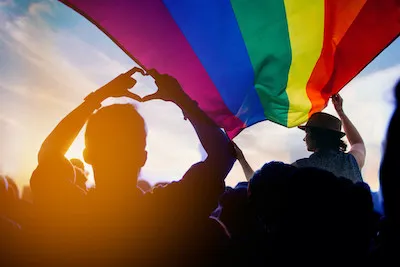LGBTQ+ relationships share a lot in common with “traditional” or heterosexual couples. Yet, you and your partner experience unique events that load added struggles on your shoulders. Luckily, LGBTQ+ relationships counselors are trained to address those unique struggles.
If you’ve never been to therapy, you may wonder: what’s the big deal? Can’t you and your partner figure out your problems on your own? Self-help is always an option but, if you really want to improve your relationship, couples therapy is vital.
Couples therapy gives you and your partner a much-needed second opinion. It can often be difficult to discuss issues in your relationship without leading to a fight or wounding one or both of your feelings.
A relationship counselor can help you two discuss relationship improvements in a much more empathetic and constructive way.
How do LGBTQ+ couples counselors do it? We’re about to tell you in this guide. Keep reading to discover the top 7 ways couples therapy can benefit your queer relationship.
1. Overcome Social Stigma
The most common issue that sends LGBTQ+ couples to a therapist is the social stigma of being in a queer relationship. Despite progressive legal movements, there are still people out there who are prejudiced against non-traditional couples and gender roles.
Even if the couple is straight-passing, there are issues that can arise from social stigma. Issues that could eventually affect your relationship. That’s why it’s so important to have a gender therapist who understands the struggles of LGBTQ+ couple.
2. Get On the Same Page About What a Relationship Should Look Like
LGBTQ+ couples are a lesson in why gender roles just don’t matter. However, challenging conditioned gender notions can make finding your relationship groove harder. After all, we learn about relationships from what we see around us.
More than likely, you didn’t have parents who modeled the type of relationship you’re in. Until recently, you and your partner probably haven’t seen yourselves represented in media. For these reasons and more, LGBTQ+ couples can find it difficult to know where to begin when it comes to defining relationship roles.
An LGBTQ+ relationship counselor can help. Therapists can help you figure out the relationship roles you know and understand as a starting point. Then, you and your partner can work together to discover the dynamic that works for you.
3. Feel Supported While Discussing Options Regarding Children
Are you and your partner planning to have children? Then this may be another issue you need help navigating as an LGBTQ+ couple. A counselor who specializes in relationships like yours has the experience and the empathy to help you overcome the obstacles to having a child.
An LGBTQ+ counselor can also help your family deal with potential social stigmas surrounding children of same-sex and queer parents. The therapist will teach you how to rise above others’ opinions. At the same time, your counselor can show you how best to talk about your family dynamics to educate others.
4. Deal With Discrimination
In addition to social stigma, LGBTQ+ couples sadly must deal with more impactful discrimination. According to a 2015 survey of transgender individuals, the top four types of discrimination experienced were:
- Housing discrimination (23% of respondents)
- Workplace discrimination (27% of job-holding respondents)
- Discrimination at school (54% of respondents)
- Healthcare discrimination (33% of respondents)
An LGBTQ+ relationship therapist can help you and your partner navigate these difficulties. Even if you’ve faced these types of discrimination in the past, a counselor can help ensure that trauma doesn’t negatively affect your relationship.
5. Improve Your Intimacy
As your relationship progresses, you may find that you and your partner have less time and energy for sex. This is normal for heterosexual couples and it’s also normal for LGBTQ+ relationships.
A relationship counselor can help you and your partner improve your intimacy. Whether this means spicing up your sex life or making the time for each other, LGBTQ+ couples therapy can teach you both to find the right balance.
6. Reduce the Impact of Minority Stress
Minority stress is a known issue within LGBTQ+ communities and other minority groups. The theory of minority stress says that members of marginalized or minority groups endure prejudice and discrimination from those around them.
Minority stress has three distinguishing factors:
- It’s not experienced by every one
- It’s a chronic condition
- It’s about individuals and social institutions
An LGBTQ+ therapist can help you deal with minority stress in two ways. First, counselors can offer you coping mechanisms and strategies. Your therapist will also encourage you to find a social support system to reduce potential symptoms of minority stress.
7. Get Help For Day-To-Day Struggles
From arguments about finances to communication issues, same-gender and other queer couples face a lot of the same issues as traditional couples. An LGBTQ+ relationship counselor is trained to help you with these issues in addition to unique struggles you and your partner might face.
As much as you and your partner have in common, you are two unique individuals. And your differences will play a role in how you relate to one another. A couples counselor can teach you how to respect each other’s differences and boundaries in a low-stress and no-judgment environment.
Find Therapists for LGBTQ+ Relationships Counseling
LGBTQ+ relationships are similar to and different from traditional heterosexual couples.
You and your partner may go through unique experiences like minority stress and social stigma. At the same time, you experience many of the same struggles as other couples, including financial disagreements.
Are you looking for a couples therapist in Albuquerque to help improve your LGBTQ+ relationship? You’ve come to the right place. Learn more about Talking Circles Therapy’s counseling services and get the relief you and your partner deserve.




